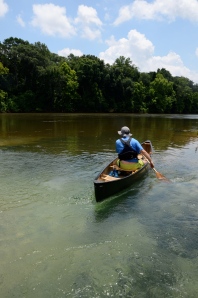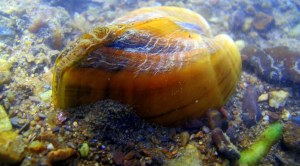
Bovine Spring is one of many springs bubbling from the Floridan aquifer that sustain flows in the Flint River.
The Georgia General Assembly is a strange place. The saga of SB 213, the so-called Flint River Drought Protection Act, is a prime example. This bill that could harm farmers is supported by the Georgia Farm Bureau. And, while its proponents claim the bill is all about protecting endangered species, Georgia’s environmental community (lovers of critters both rare and common) opposes the bill.
It’s enough to make even a seasoned legislator scratch their head and wonder…what’s going on here?
Here’s what’s going on:
The Flint River is getting drained dry. Water diversions and water treatment systems in metro Atlanta divert millions of gallons of water from the Flint daily, and downstream in southwest Georgia’s agricultural belt, the state has issued more than 6,500 permits for watering farms around the Flint River. In the upper Flint, studies show that today during droughts there is 70 percent less water in the river than during comparable droughts in the 1950s and 1980s.
In 2001, the state passed the first Flint River Drought Protection Act: that law authorized the state to pay farmers not to irrigate their crops during droughts. Not surprisingly, that plan didn’t work so well.
The latest Flint River Drought Protection Act requires farmers implement water conservation measures and irrigate crops more efficiently—a great plan!
CLICK HERE TO VIEW A YOU TUBE VIDEO ABOUT SB 213
Unfortunately, the bill includes a Trojan Horse—and this horse is what has legislators flummoxed. The bill, which is awaiting final passage in the House of Representatives, includes language that that supports a “flow augmentation” scheme.
The state will take water from the Floridan aquifer (the very groundwater most farmers use to irrigate their crops) and pump it into deeper underground caverns for “storage.” Then when flows on the Flint get low, they’ll pump the water out of the ground and into the Flint. Sound preposterous? It is.
This process, often called “aquifer storage and recovery,” has never been done successfully in Georgia, and where it is used elsewhere, it has met with limited success. Some projects have failed to yield the amount of water expected and in other cases, the projects have contaminated pristine groundwater.
The Deal Administration doesn’t even know if its scheme will work. It’s currently investing more than $4 million on a test project on the Flint, and they say if it works, it will be used to protect endangered species.
That’s Interesting.
The same administration that has funneled $160 million to dam and reservoir projects in the past two years that will wipe out habitat for endangered fish is now an advocate for endangered mussels?
Here’s where the soldiers bust out of the Trojan horse. This test project was originally pitched by political insiders close to the Deal Administration. The plan is to build up to 150 augmentation wells in Southwest Georgia and pump up to 250 million gallons a day into the Flint to create a “water exchange” that will enable metro Atlanta to take more water from the Chattahoochee River which joins the Flint at the Florida state line.
The cost of this grand scheme: $900 million to $1.2 billion, presumably to be financed by taxpayers and water customers.
What’s worse is that language in this bill would allow Atlanta bureaucrats to prevent farmers along the Flint from withdrawing water from the river when these “flow augmentation” projects are operating—essentially assigning “ownership” to water in the river.
This provision could undo 200 years of Georgia water law that says Georgia’s water is not owned by anyone, but is available for the reasonable use of ALL waterfront property owners.
Georgia’s House of Representatives needs to vote “NO” on this bill. A yes vote, regardless of the Deal Administration’s real motives, is a vote that will endanger Georgia water law, take rights from property owners and put taxpayers on the hook for a water supply scheme that could cost more than $1 billion.
Feb. 21, 2014

